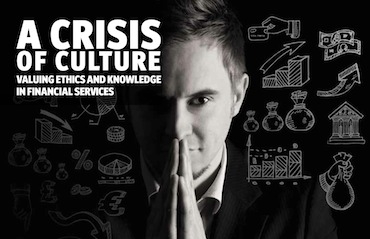A new report has found that 53% of financial services executives say that adhering to ethical standards inhibits career progression at their firm.
The same number say that strict codes of conduct would harm their firm's competitiveness and 43% have had to introduce incentives to encourage ethical conduct. Despite this, an overwhelming 96% of staff prefer to work for a firm with a good reputation on ethical conduct.
A crisis of culture, a new Economist Intelligence Unit (EIU) report sponsored by CFA Institute, finds that while financial services firms are taking steps to improve their record on ethical conduct, basic tensions in how the industry works make long-term change a distant goal.
Nearly all respondents to an EIU survey conducted for the report champion the importance of ethical conduct in the financial services industry. But industry executives struggle to see the benefits that greater adherence to ethical standards would bring to their firm: 53% think strict such codes damage competitiveness, and only 37% think it would have a positive financial impact.
The IFP has placed great emphasis on ethics and includes a requirement for ethics CPD. It also runs courses and seminars on implementing ethics within a Financial Planning practice.
{desktop}{/desktop}{mobile}{/mobile}
Sara Mosavi, editor of the report, said: "There is little doubt that financial services firms are trying to change their ways. But the jury is still out on how successfully they will be in rebuilding their culture. Some of the pressures firms faced before the financial crisis, such as quarterly reporting requirements and pleasing short-term investors, won't go away any time soon. The question then is whether the industry's top echelons are doing enough to risk-proof their firm and better serve their clients."
As well as recognising ethical conduct to be crucial to improving their firm's resilience to further shocks, financial services executives also point to improved knowledge as critical to their risk-proofing efforts.
Three-fifths of survey respondents say gaps in employees' knowledge pose a significant risk to their firm. Still, 62% say employees don't know what is going on in other departments at their firm. Also, despite the ongoing globalisation of the regulatory framework governing the industry, only 12% say they are confident in their knowledge of the global regulatory environment.

